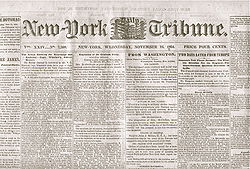
The American Newspaper Repository is a charity whose purpose is to collect and preserve original copies of American newspapers. It was founded in 1999 by the author Nicholson Baker when he learnt that the British Library was disposing of its collection of historic American newspapers. He cashed in his retirement fund to successfully bid for the collection at auction. With support from the Knight Foundation and MacArthur Foundation, the repository was established in a building in Salmon Falls Mill Historic District in Rollinsford, New Hampshire. [1] [2] While serving as a director, Baker researched and wrote Double Fold: Libraries and the Assault on Paper about the way in which other library institutions were destroying rather than preserving such originals. [3]
Contents
The collection was transferred to the care of the David M. Rubenstein Rare Book & Manuscript Library, part of the Duke University Libraries, in 2004. [4]